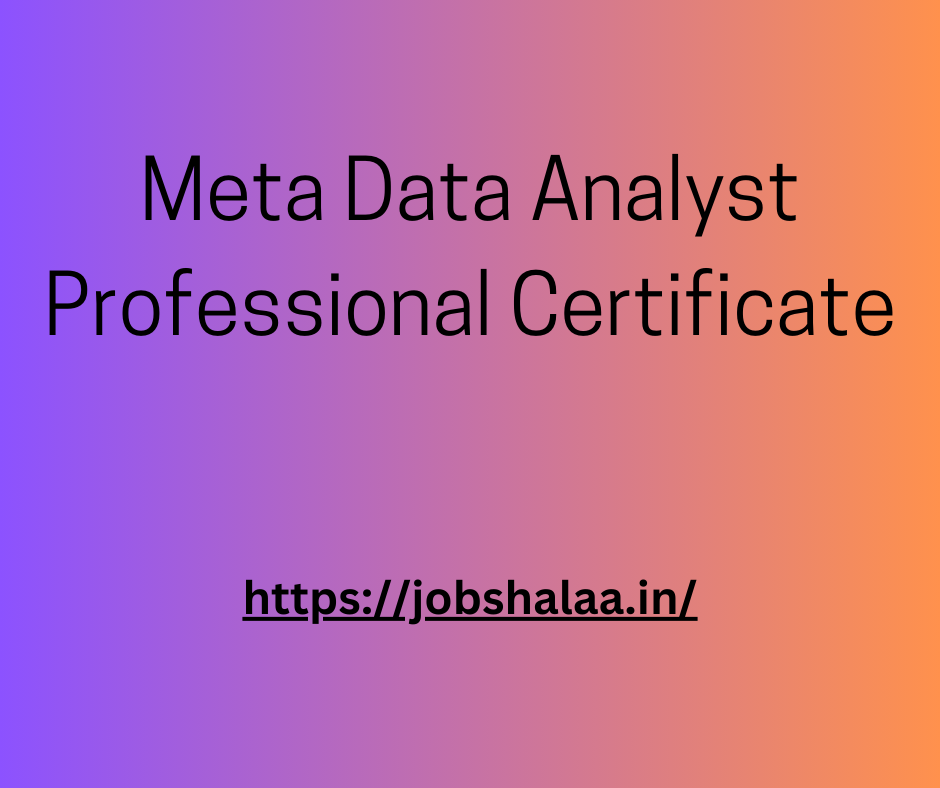The Meta Data Analyst Professional Certificate is an industry-recognized credential designed by Meta, formerly known as Facebook, to equip individuals with the skills and knowledge needed to thrive in the rapidly growing field of data analytics. The program is hosted on platforms like Coursera, making it accessible to a global audience. It aims to address the growing demand for skilled data analysts, a profession that continues to experience exponential growth as organizations increasingly rely on data-driven decision-making.

Data analytics involves collecting, cleaning, analyzing, and interpreting large sets of data to uncover meaningful insights. These insights can drive key decisions across various industries, including finance, healthcare, retail, and technology. The role of a data analyst is crucial in today’s information-centric world because it empowers organizations to operate more efficiently, understand their customers better, and improve their business strategies.
Who Should Enroll in the Meta Data Analyst Professional Certificate?
The Meta Data Analyst Professional Certificate is designed for individuals with little to no prior experience in data analysis. Whether you’re a fresh graduate looking to break into the field, a professional wanting to switch careers, or someone seeking to upskill for career advancement, this program is structured to provide you with comprehensive knowledge from the ground up. The course assumes no background in coding or data analytics, which makes it particularly attractive for beginners.
Moreover, the certificate is beneficial for those who are passionate about working with data but have felt intimidated by the technical nature of the field. By offering hands-on projects, expert instruction, and structured lessons, the program helps demystify the technical aspects of data analytics and makes the subject approachable to a wider audience.
Overview of the Program Structure
The Meta Data Analyst Professional Certificate is structured into multiple modules, with each focusing on specific areas of data analytics. These modules are designed to progressively build a learner’s expertise. It offers a comprehensive curriculum that covers everything from foundational concepts in data analysis to more advanced topics, like working with large datasets and performing complex statistical analyses.
A typical learner can expect to complete the certificate within approximately six months if they dedicate around 10 hours per week to the course. However, the program offers flexibility, allowing participants to work at their own pace, which is beneficial for individuals balancing other responsibilities like work or family commitments.
Core Modules of the Meta Data Analyst Certificate
The certificate program comprises several key courses, which include:
- Introduction to Data Analytics
- This course lays the groundwork for the rest of the program by introducing learners to the field of data analytics. Topics such as the role of a data analyst, how data is used to make decisions, and the importance of data-driven organizations are covered. Learners also gain an understanding of data types, metrics, and how to develop a data-driven mindset.
- Data Collection and Storage
- In this course, participants learn about various methods of collecting and storing data. This includes a deep dive into the types of data (structured and unstructured), data warehouses, and cloud storage solutions. By the end of this course, learners are familiar with how companies collect data from different sources, including customer data, sales data, and social media data, and store it for future use.
- Data Preparation
- Before data can be analyzed, it needs to be cleaned and prepared. This course focuses on teaching participants the best practices for cleaning and organizing raw data. Topics include handling missing data, dealing with data inconsistencies, and using tools such as Excel and Google Sheets to prepare data for analysis. This course is critical for understanding how to make raw data usable.
- Data Analysis
- This is one of the core courses in the certificate. Participants learn how to analyze data using statistical methods. Concepts such as descriptive statistics, inferential statistics, and hypothesis testing are introduced. Tools such as SQL (Structured Query Language) are used to manipulate and query large datasets. The focus of this course is on helping learners draw meaningful insights from data and effectively communicate these insights to stakeholders.
- Data Visualization
- Data visualization is essential for translating complex data sets into easily digestible formats. In this course, participants are introduced to various visualization tools like Tableau and Power BI. They learn how to create charts, graphs, and dashboards that make data easy to understand for both technical and non-technical audiences. Data storytelling is also emphasized, which is the ability to narrate insights through data visualization effectively.
- Advanced Data Analytics with SQL
- This course dives deeper into SQL and teaches advanced techniques for querying data. Participants learn how to join datasets, perform aggregate functions, and create subqueries. These advanced skills enable learners to handle larger, more complex datasets and perform sophisticated analyses. By the end of this course, participants are confident in their ability to use SQL to manipulate and analyze data efficiently.
- Capstone Project
- The program culminates in a capstone project, where participants are tasked with applying all the skills they’ve learned to a real-world data analytics problem. This project provides hands-on experience and an opportunity to build a portfolio that can be showcased to potential employers. It also gives learners a taste of what it’s like to work as a professional data analyst, from identifying a problem to collecting and analyzing data and finally presenting the insights.
Tools and Technologies Covered
A significant advantage of the Meta Data Analyst Professional Certificate is its focus on real-world tools that are widely used in the data analytics industry. By the time participants complete the program, they are proficient in several essential tools, including:
- SQL: SQL is one of the most important languages for data analysts. It allows them to communicate with databases, query data, and extract useful information. The program ensures that learners are proficient in SQL by the end of the course.
- Tableau: Tableau is a powerful tool for data visualization, and the certificate includes comprehensive training on how to use it to create interactive dashboards and visually compelling reports.
- Excel/Google Sheets: Despite the emergence of more advanced tools, Excel and Google Sheets remain fundamental in data analysis. Learners are trained to use these tools effectively for data manipulation and analysis.
- Python: Although not a primary focus, the certificate touches upon basic Python programming, particularly for those who may want to pursue more advanced data analytics roles.
The Importance of Soft Skills
While technical skills are critical for data analysts, the Meta Data Analyst Professional Certificate also emphasizes the development of soft skills. Effective communication, problem-solving, and critical thinking are essential for a successful data analyst. The program teaches participants how to translate complex data into insights that non-technical stakeholders can understand, which is often the most challenging part of the job.
Get your certificate from here
Another key soft skill emphasized in the program is attention to detail. When working with data, even small errors can lead to incorrect analyses and flawed decision-making. The program trains learners to be meticulous in their approach to data collection, cleaning, and analysis, ensuring accuracy at every stage.
Career Outcomes and Job Prospects
Upon completing the Meta Data Analyst Professional Certificate, participants are well-prepared for various data analyst roles. These roles can be found across industries, ranging from tech companies and healthcare organizations to financial institutions and retail businesses. Data analysts are highly sought after, and the demand for these professionals is expected to continue growing as more organizations recognize the value of data-driven decision-making.
The certificate program also offers career support through resources such as resume-building workshops, interview preparation, and access to a job board where participants can apply for roles within Meta and its partner organizations. Additionally, the certificate can serve as a stepping stone for individuals interested in pursuing more advanced roles, such as data scientists or machine learning engineers.
How the Meta Data Analyst Certificate Stands Out
While there are several data analytics certificates available in the market, the Meta Data Analyst Professional Certificate stands out for a few reasons. First, it is designed by Meta, one of the most influential tech companies globally. Meta’s involvement ensures that the curriculum is cutting-edge and aligned with the latest industry trends. Additionally, the certificate offers a hands-on, project-based approach to learning, which is critical for building practical skills.
The program also emphasizes inclusivity and accessibility. By providing a pathway for individuals with no prior experience, it democratizes access to a high-demand profession. The affordability and flexibility of the program further enhance its appeal, allowing learners to upskill without the financial burden of traditional degree programs.
Most Important
The Meta Data Analyst Professional Certificate is an excellent option for individuals looking to break into the field of data analytics or advance their careers in the industry. With a well-rounded curriculum that covers essential technical skills, practical applications, and soft skills, the program prepares participants for success in data analytics roles. The certificate’s emphasis on hands-on projects, real-world tools, and career support further enhances its value, making it a compelling choice for aspiring data analysts. As data continues to shape the future of business, professionals equipped with the skills taught in this program will be well-positioned to thrive in a data-driven world.
